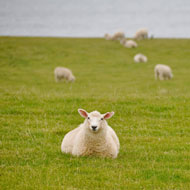
Warning follows discovery of bluetongue in sheep from France
The National Sheep Association (NSA) is urging farmers to think hard before importing sheep from any countries that carry a high risk of disease, after four sheep imported from France were found to be infected with bluetongue virus.
NSA chief executive Phil Stocker said that while the import and export of quality breeding animals is important, farmers and traders must be aware of the risks, which could threaten the UK’s whole livestock industry.
Farmers are being advised to research high risk diseases associated with different countries before choosing to import. If it is felt necessary to import the animals, Mr Stocker said taking steps beyond statutory controls should be considered.
“While in this case it is a legal requirement for stock to have been vaccinated for bluetongue prior to export this case shows the system cannot be fully relied upon,” he continued.
“The NSA would like to see farmers and traders apply the ‘buyer beware’ principle and to have the animals tested to make sure they have developed immunity prior to leaving the farm of origin.”
There have been ongoing issues with several different strains of bluetongue in a number of European countries, which are largely being picked up by surveillance.
Mr Stocker added: “Whilst we recognise that there are valuable bloodlines available in some of these areas, there is no benefit to anyone in spreading this disease and we would expect anyone looking to bring animals into the UK to take every precaution against this.”
On arrival in the UK, animals should be kept in isolation until the Animal and Plant Health Agency has completed tests. However, even with this precaution, it would be difficult to prevent midges accessing them and potentially causing a major outbreak in the UK.
“The NSA couldn’t be more serious about urging farmers to run full risk assessments and think hard before importing animals from any ‘at risk’ areas,” Mr Stocker added.
“In addition to checking they have had their vaccinations, we would strongly advise demanding a PCR and serology blood test before they leave the departing farm and country.”



 The Veterinary Medicines Directorate (VMD) is inviting applications from veterinary students to attend a one-week extramural studies (EMS) placement in July 2026.
The Veterinary Medicines Directorate (VMD) is inviting applications from veterinary students to attend a one-week extramural studies (EMS) placement in July 2026.